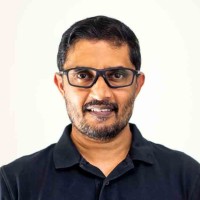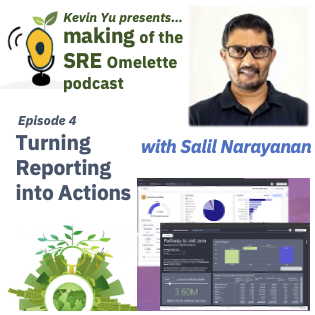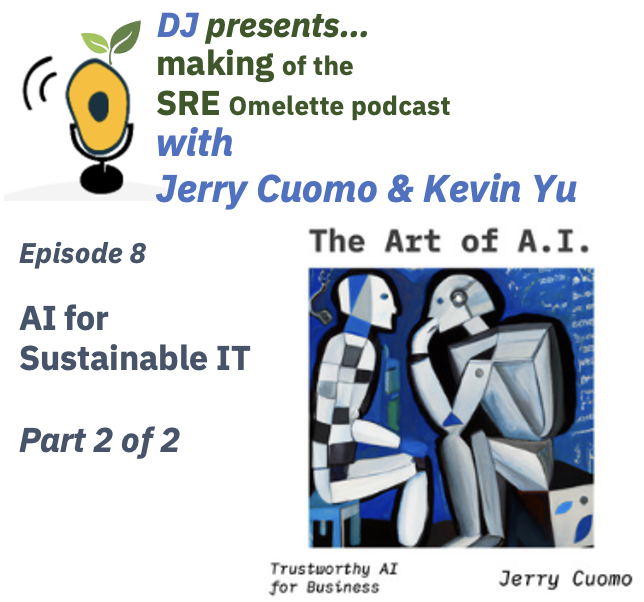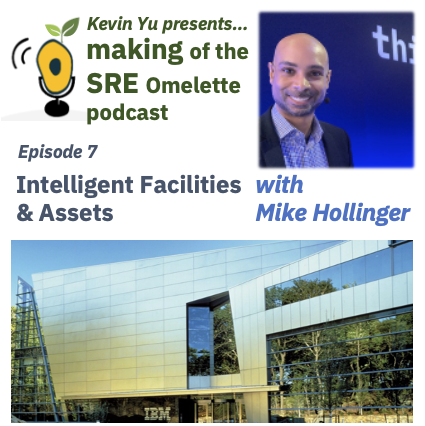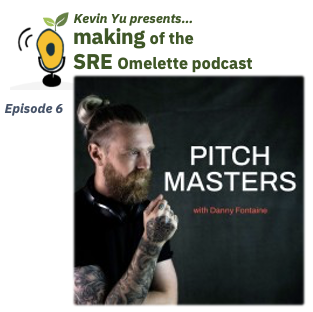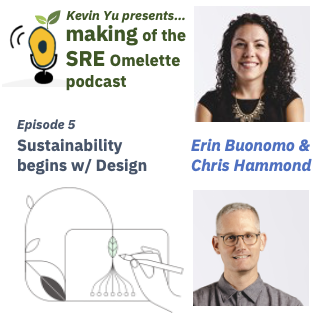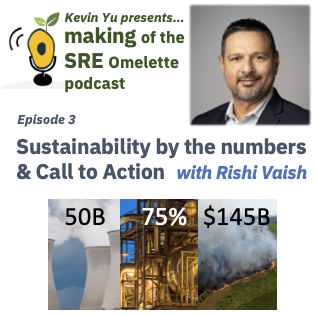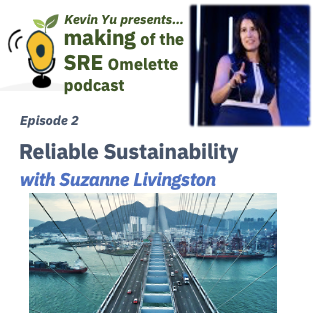Episode 4 - Turning Reporting into Actions
- 0.5
- 1
- 1.25
- 1.5
- 1.75
- 2
Salil Narayanan: Make sure that you get data from source. It's measured from primary sources, it's not that you ask somebody to go and estimate or capture data across the whole value chain. If people start with accurate data from the ground up, then and only then when we get to an accurate picture.
Kevin Yu: Hi everyone. Welcome back to another episode of Making of the SRE Omelette Podcast, where we talk about how we achieve business and client success via the practice of Site Reliability Engineering. Season two is all about how the practice of SRE can help and lead us to a more sustainable future. Here, talk about how to start your sustainability journey with measuring and reporting is Salil Narayanan, CTO of Envizi. Because you can't improve what you don't know. Welcome to the show, Salil.
Salil Narayanan: Thank you very much, Kevin. It's a pleasure.
Kevin Yu: Salil, thank you for spending the time with us and I can think of a no better person to speak to this subject than you. Can you get us started on your personal journey that led to the role you have today?
Salil Narayanan: Yeah, look, I think my involvement with Envizi actually predates Envizi. In about 2005, I co- founded a business that was focused on energy management, which later merged with what became Envizi. Envizi started at around 2008, and in fact even before that, the CEO of that company that we founded and myself used to own another business that did payments before that. So it goes a long way. So anyway, that's where Envizi got started. We had this initial platform that did energy management and then David Solsky found a business opportunity with sustainability, which was becoming an important area. And so Envizi got started and I had actually left that business and gone back to building banking products, which has been an area of focus before that. And then once the business took off and found product market fit, I came back into the business and initially started and led the product team and then later focused on building solutions to drive sales and now focus on the development side of the business. And as one of the directors of the business, you would focus on anything that's needed at that time to drive the business. So that's my personal journey. It's been a long one. Envizi's journey itself was, it's interesting. So we initially started out focusing on managing energy, which then transitioned to managing emissions related data. The platform we built was always flexible, so these changes in the industry and business requirements over time, we were able to deal with it using the same platform. So initially there was a big expectation that sustainability management, or more specifically emissions reporting would be a major business driver in around 2008. Many, many companies got started globally, and it didn't turn out to be such a massive market. So a lot of companies failed and didn't do well, but Envizi did really well because we were in a good market. Australia had a good demand, there were legislation required people to report, and the GFC had affected many countries, but less of an impact in Australia. So we did well and we had lots of turns in our journey. We've went to focus on energy management, building optimization, optimizing HVAC equipment and so on to drive emissions down. But the main problem of gathering sustainability data, making sure you have a solid data management platform and ability to report that data in a compliant way to your clients, to your markets and to regulatory bodies and so on, became more and more important. So our focus really is on that area. We tried to grow in different markets. We went into Asia, Africa, Europe, and the US, and finally just focusing on in the US and UK and Australia as our key markets, we went and won lots of big logos including IBM and so on. And then after 10 years, what we originally thought will finally happen, which is that's something became a key driver. And we believe that every organization in the world will now manage this data and most of them will buy software to deal with that. So that's become really big. And I think IBM's vision was the same. IBM wanted to drive into that area and we were already a client. So it was kind of a really good match for the IBM to acquire us, to drive our product and what we do more broadly into the world.
Kevin Yu: Wow, what a fantastic journey. And the finance is getting started.
Salil Narayanan: It's a big journey now ahead. I think there's a lot of work to be done, but we're well positioned in IBM to do that.
Kevin Yu: Salil, you guys definitely had the vision and started this past before sustainability was big and even mandated. I'm curious, what does sustainability mean to you, and how has it changed over the last 10 years?
Salil Narayanan: From an Envizi perspective, we focus on one aspect, which is managing sustainability related data and a focus even within that on GHG emissions related data. So it's a very specific focus we have. It's an important one and a very big problem in itself. Sustainability is a major objective, major problem, but what we deal with is just that data management and reporting, and that itself is important, and sustainability is a very big space. We focus on this one aspect, but that aspect actually underpins making sustainability a mainstream business activity. So if you do not have data and you can't track it, I don't think it would've become a mainstream business focus that every business drives. So I think it is an important one. So sustainability is changing over time. I think there's always been concern around sustainability in various ways, but I think the more recent driver in the last decade and going forward is the sustainability related concerns around GHG emissions. And that's because of global warming and concerns around carbon emissions. So that's become a major focus. It's not the only thing in sustainable job. Obviously there are lots of other environmental, social and other aspects to sustainability, but this is a core area of focus. And for us, that has been the main area and I think that's made sustainability a key focus in business today or in government today and so on, is the emissions related challenge. And that itself is very big. So for us from an Envizi perspective, we focus on data management, especially on emissions.
Kevin Yu: And Salil, over those years, I'm sure you have seen many customers going through this journey, right? What have some of the top challenges you have seen them facing?
Salil Narayanan: We've been with many customers, many of them leaders in the world in this space for over a decade. So it is a journey for customers, right? It's a journey where they have to decide what they need to do. They could be driven by their own values, they have values around sustainability. Sometimes it's driven by commercial reasons as well, but they have a value around being more sustainable, having more efficient buildings or whatever. They're also driven by legislation and compliance requirements. So you need to record and report data. If you're a commercial property owner, they might have energy star rating you need to meet and so on. They have pressures from customers. Customers are watching out and they expect you to be sustainable. And also more recently, there's huge pressures from supply chains, because people don't want to buy from companies that do not have clarity and transparency on their emissions or water use or waste generation or some other sustainability metrics. So there are many drivers. For them, it's a journey, deciding what they need to do, what's driving it, and then how to go about it. Then having a focus, maybe hiring a sustainability manager, gathering data and then saying, " Okay, this is the position. How do we improve it? How do we actually go about doing this without impacting the business or without making huge losses?" So you have to find ways of being sustainable in a cost- effective way, in a cost- efficient way, or even in a profitable way. Sometimes you can get sustainability goals that are actually profitable as well. So those are the major challenges customers face, is actually deciding to take action and then making that leap towards doing it. Nowadays, they're being helped along by these pressures, right? It's forced upon many others. In the early days they were driven by their own drive and values and then sometimes commercial imperatives, but nowadays, they're driven by the supply chain, by legislation and so on. So I think that's been their main challenges, actually deciding to take action. And then once you decide figuring out what to do, sometimes things get easy. For example, with renewable energy prices dropping and renewable energy being available became easier for organizations to commit to something like a net- zero because they can now buy renewable energy and get there and they can understand what the cost is and how to go about it. So life became easier to make that decision. Sometimes it's not that clear for other organizations, that's their main challenge.
Kevin Yu: It is a little carrots and sticks, right? Both motivated by the market or being asked by the legislatures.
Salil Narayanan: A lot of times businesses are recognizing that sustainable options are not just required for sustainability outcomes, but they're actually required for the longevity of the business. So for example, if you are into automobiles and you decide not to look at electric cars, your business might not survive it because the world is moving that way. And if you're a power generator and you decide to stick with coal, you might not be around in 10, 20 years time. So it's become very, very different now.
Kevin Yu: Actually in many ways, technology as much as a love token, networking, I mean sticking around with that probably that would lead me to nowhere.
Salil Narayanan: Exactly. I think that's part of it. It has become a really important aspect of business and government and politics and everything else.
Kevin Yu: Definitely. And at the beginning of episode we mentioned to drive change, you have to have visibility. What are some of the blockers to get visibility that you have seen for the customers?
Salil Narayanan: Visibility, it's difficult to get a full picture of your sustainability metric, whatever that might be. Let's say you want to understand how much water you use or how much pollutants you generate or how much of scope one, two or three emissions you're responsible for or what the emissions component of your products you buy from your supply chain. This information is not available. It has not been, and it's very difficult to get by. So visibility basically boils down to having access to that data, and it is still completely early days for that, especially when it relates to your supply chain and scope three, it's the next wave where you need to get good data. A lot of those estimations nowadays, estimations based on spend or estimations based on different things. There's a lot of work to be done in getting good data. So yeah, I think the blockers to visibility is always data. And it might be as simple as, I don't know how much electricity I use, which is an easy problem to solve, you get meters or billing data, but it gets harder when you look at your actual value chain.
Kevin Yu: Salil, I'm curious, is a problem solved once a customer has the data and the reports?
Salil Narayanan: No. No. It's not at all, right? That's just a very modern first step, but it doesn't even start solving the problem. So access to good data and then being able to report on it is a first step. Usually that is a start of the journey to improve on sustainability metrics. So you get hold of data, you measure and you report so that you can then improve on that. And so that's the start of the journey. And a good example is you managed to track down all of your electricity use. Then you'd say, " Okay, I'm going to go net- zero with respect to my energy use." So you move to electricity and then you buy renewable energy and you get there. So that's the outcome, is the action you take. So yeah, it's just a start of the journey, but without measuring it and tracking against it, you can't actually make an impact. And it's an important one because if there's no pressure to accurately measure this and report that, the regulations are not there to report this accurately and it's not audited, you have no way of knowing what's happening, and companies that may spend on sustainable outcomes may be disadvantaged. So I think it's a journey. This is just the start of it. Getting the data is just the first step. It's not the outcome at all, right? I mean, it might be an outcome from, " Oh, I need to comply with this report." But that's-
Kevin Yu: Maybe it's a milestone to start. Speaking of the next step and the reporting, are there best practices that you can share with the audience here? What are the things to do, and just as important, what are the things not to do with the data on reports?
Salil Narayanan: I think one of the things to do is make sure that you get data from source, make sure that it's as accurate as possible or as close to the source as possible. So if you are measuring, let's say your fuel use or water use or electricity use, et cetera, for scope one and two, that it's measured from primary sources. It's not that you ask somebody to go and estimate or capture data or something like that. I think that's pretty much you can get to your bills or your meters and so on. So if you're accurate about that, when you reflect that in the value chain, then your scope three reporting also becomes accurate. What are all the inputs that go into your products? You manufacture? How much energy, how much materials, and so on. So I think that's one of the more important things is across the whole value chain. If people start with accurate data from the ground up, then and only then would we get to an accurate picture. So I think that's one of the important things. The second thing is to follow standards. So how do you recognize attribute things like renewable energy that you generate, the sources of energy that you use, what emission factors they have, how much of it do you attribute to your own business versus you don't? For example, if you've leased spaces out, how do you deal with that? So there are rules around how you report the data, so you don't need to follow that, and you don't need to be transparent, and if you're not, you can get into trouble. I think recently we have something, a big airline in the US being cost action against them for report greenwashing and so on. So yeah, the best practice is to get good data, manage it accurately, and have it audited and checked just like you would do with any other financial data, if you report your wrong sales numbers and so on. I think that's where sustainability data is going. It's making its way into financial reporting. I see a lot of customers acquiring the same controls that you apply to financial data being required of sustainability data.
Kevin Yu: So Salil, once you have good data, which comes from getting it closer from source and verified, what's next?
Salil Narayanan: It depends on the organization. If you are driven by objectives around sustainability, then the next step is to put a lot of resource, focus and action into that. So the leaders in the space have been doing that and they would have goals, like I mentioned, if you're into manufacturing, you will try and reduce the waste generation, pollutants and so on. That's one aspect. Or GHG related impacts, you would buy renewable energy and so on. So it's about action. If you are a commercial real estate owner and it'll be about making the facilities more energy efficient, again, moving to renewable energy and so on. I think the challenging step is taking action and making a sustained multi- year commitment to improving those outcomes. I think it's become easier for people to do this now because they are required to do so. They're required to do so for survival. I mean, the market demands that, your clients demand that, and a lot of times if you don't do it, you might be out of business. So that becomes easy. It was harder when you didn't have those risks. You're not driven by compliance or risk and you wanted to make a change. I think we were lucky to be involved with many companies who were doing it because they wanted to and they were leaders. That was more exciting. But nowadays it's really good that it's happening, but people are forced into it, which is a good thing. So I think the step was more challenging when it wasn't mandatory or required to make that commitment. Nowadays, I think it is easier because you have to, don't have an option. So the next step is easier. You still have to go and execute on it, but making that decision is easy enough. It's forced upon many.
Kevin Yu: It is interesting you mentioned that, Salil. It is very much like the days when reliability features were an afterthought, but when customers demands and expects a reliable and performance system, SRE has become front and center of IT today, and it is a perfect time to bring this episode closer to Site Reliability Engineering. Salil, I'm curious, what does sustainability mean to you in the context of reliability engineering?
Salil Narayanan: I think there are two parts to it. One is making software more reliable and more efficient, which then makes it consume less resources, generate less emissions, and so on. But the bigger picture is that everything that, at least in the areas that Envizi is involved in, or a huge part of sustainability management in general involves software. Software drives everything in the world, right? So whether it's gathering data, you have meters, sensors, entire grids, utility grids, sensor networks, industrial manufacturing sensors, all of that is software. So SRE and software in general plays a key role in managing sustainability data. Software plays a key role in implementing change, tracking and managing and making sure that systems operate in a more sustainable way, they reduce their emission. So I think we shouldn't lose sight of the fact that the entire world is run by software and SRE plays a key role in any outcome. If you're in a hospital and your objective is to make sure patients do not die, SRE becomes really important. You don't want those systems to crash and people die. Similarly, if you want to track manage and make improvements to some sustainability metric, let's say you don't want pollution or you don't want to increase GHG emissions and maybe you are in an oil well and you don't want to vent too much methane or whatever the goal is, software plays a key role. So I think SRE plays a role across the entire chain in ensuring that systems that you used to track, monitor and manage and get sustainability outcomes are reliable and doing their job. I think that's the bigger impact SRE has on sustainability.
Kevin Yu: Nicely captured. SRE is essential for how software operates and it's no different for sustainability.
Salil Narayanan: Whatever the goal is, right? It's not limited to sustainability, I think. If you want to report your financials accurately, you need to make sure that all your systems across the entire organization manage that data accurately and report on it correctly. With sustainability, software plays a big role in making sure you have actions taken and tracked and managed, so your outcomes really depend on good data.
Kevin Yu: So somewhat related to the previous question, what is your take on sustainability as it relates to energy footprint and efficiency?
Salil Narayanan: So I think it is just one part of it, but it is very important one, and Envizi's background is in that space, especially when you start off by trying to measure your own scope one and two footprint with respect to emissions, it really boils down to energy, footprint and efficiency. How much fuels and scope one you have, as well as how much electricity or scope two that you consume and so on. So energy efficiency and your energy footprint is directly correlated to your scope one and two emissions. So that's definitely a one- to- one relationship there and most organizations start with that trying to make sure that they use either less energy and have a smaller footprint or when they have to use energy that becomes renewable. I think longer term, reducing energy use will not be a goal and we will use as much energy as we need because energy is going to be renewable and it's not going to have a negative impact. But until such time you do want to make it efficient, and then that feeds into everything. So if everyone does that, then naturally your big source of emissions, which is your scope three, will also become less. If everyone in the value chain reduces their energy footprint, it has a direct impact on the emissions' footprint. So I think that's where the relationship comes in. Energy efficiency relates to reduced emissions because a lot of our energy sources are emissions intensive. In the future, that will not be the case as renewables become the majority source of energy, then energy efficiency is not a requirement, but it is right now.
Kevin Yu: Great insight. As energy source becomes renewable, consumption becomes less of a concern as it relates to sustainability. So it reminds me of the days when we had to optimize our one gigabyte JBN, because scaling out took days, as scaling became easier, and since unbounded, JBN optimization is now less of a concern. Salil, I'm also curious, without naming names, what are some of the big finds you have seen from customers that surface found reporting?
Salil Narayanan: Over a decade of working with hundreds of clients, you hear a lot of interesting stories and unexpected things. A lot of them are actually financial. A lot of customers start tracking and then they realize that they've been paying huge amount of utility bills for buildings that they left years ago or funny stories like that. Or someone customer had usual water use and then they went and saw that they're actually paying for water use in part of a shopping center and so on. So it is interesting, it's financial, but there's also wastage of water leaks or energy left on. So we've had some clients who saved tens of millions of dollars and they've actually testified to that. It's not because of our software, obviously it's because they've been diligent in trying to find problems and fix them and be more efficient. They wouldn't have been able to do that without data and software, but it really is about the client wanting to achieve something. We've kind of run into a lot of clients telling us about these interesting things that they found mostly relating to financial wastage and also energy, water and other environmental things. Very interesting stories.
Kevin Yu: Thank you for sharing those interesting stories. And Salil, I think you've been too humble there. Credit to the customers for asking those questions, and software like Envizi definitely makes it easier to surface opportunities of optimization. And speaking of forgotten office buildings, I know I probably have a few dev environments and instances I have forgotten over the years. I should probably go and check and clean them out.
Salil Narayanan: Yeah, from an SRE perspective, I'm pretty sure that everyone's running a lot of servers and software that no one's using these to inaudible. So I think even personally, you subscribe to all these things that you may not have using. So I think just finding wastage on compute resources would be an interesting exercise. You don't know that you need to turn something off because you don't know what the consequence of turning it off is, so you leave them on forever.
Kevin Yu: Definitely. So Salil, a big part of this podcast is technical vitality. Given your entrepreneurial spirit that led you to co- found Envizi, any advices you have for Site Reliability Engineers to help lead us to achieve our sustainability goals?
Salil Narayanan: Yeah, I think the entrepreneurial spirit is one that is not related to just starting a business or something like that. It is one that you have in large organizations. Well, for example, it's topical for us right now. IBM software is trying to be much more entrepreneurial in nature, really improve our outputs and number of clients we get and so on. So I think all of us are required to change the way we operate, to be more entrepreneurial within the organization, to make sure we are more agile in terms of reacting to the client, the market, and winning more customers and providing more value to our customers. So I think that is expected of all of us. SRE, there's no exception to that. I think we are expected, and I think we all should think entrepreneurially and that if this is our business, how would we go about making it more efficient? How would we go about making it more valuable to our clients? How would we solve more problems? How would we be more effective in the market, in how we sell, how we support, how we enable our people to use it? And a lot of that comes down to SRE. If our platforms are not reliable, efficient, we can't scale them, their performance is poor, then our objectives around that we have of significantly increasing our output. Number of clients, logos, product led growth, all of these require change, massive change for us to be much quicker, and also to be more entrepreneurial. That may not be the way it's normally described, but that is actually part of it. So yeah, I think SRE has to play a key role in making sure that these difficult and interesting, exciting challenges that we have to meet those objectives that they are taken on seriously. And it's a great opportunity, only a small part of entrepreneurial activity in the world. It relates to starting a new company, something like that. You might do that once in your life, but at the rest of it is actually within an organization. Once you start a business, whether that's a small one or a big one like IBM, you still have to be on your feet. You have to think entrepreneurial every day and become a better product, a better team, a better company. And yeah, I think it's a universal thing.
Kevin Yu: That is a unique perspective and I love it. Take ownership regardless of the size of the company, see what we can do to make our customers happy, give them more value and drive changes to get there. SRE in the right spot as SRE is essential to improving our efficiency of scale and velocity to get there. And with it, we have arrived at the final question, and it goes back to the inspiration of the podcast. Salil, what is your ingredient and recipe for companies to turn their sustainability reporting into actions?
Salil Narayanan: I think you do need to have a vision and a rallying call around some objective because without that, you can't drive the change needed. So I think that will be my feeling is that you'd need to have a vision and a clear objective, and that'll let you change your reporting into action. So if you do not have a call around, look, we are going to achieve this, or we need to be net- zero or we're going to stop polluting this waterway, or whatever the objective is, it has to be a high level rallying call. And that I think is the important thing. And then if you have that, you can make things happen, especially from turning reporting into action. Reporting with no actions doesn't achieve anything.
Kevin Yu: Definitely. Reporting without action it just more meetings, and I couldn't agree more. Having that inspirational vision is important for people to know the destination as well as motivation. Salil, it's been a pleasure. I learned so much. And thank you for spending the time with us today.
Salil Narayanan: Thank you very much. It's been a pleasure. You're doing a great entrepreneurial thing here by having this podcast, that's an example, right? Of doing something within an organization, that's a great initiative you have. It's awesome.
Kevin Yu: Salil, you're too kind. You're welcome back anytime.
Salil Narayanan: Thank you very much. Thanks, Kevin.
Kevin Yu: I also like to thank you, the audience for listening. I am Kevin Yu, Principal SRE of IBM Sustainability Software. See you on future episode where we'll continue to talk about how the practice of SRE can lead us to a more sustainable future.
DESCRIPTION
If you can't measure it, you can't improve it. This applies to SRE as well as Sustainability.
Salil Narayanan - CTO of Envizi captures what it takes to start the Sustainability journey by taking action from reporting. Salil had the foresight of carbon footprint impact management back in 2003 and co-founded Omni Meta - which became Envizi. He shares stories over the past 20 years in this space, tips to good visibility and how legislatures have influenced the industry.
Salil also gives a call to action for Site Reliability Engineers and all practitioners on embracing the entrepreneurial spirit to drive value for customers and businesses we support.
Today's Host
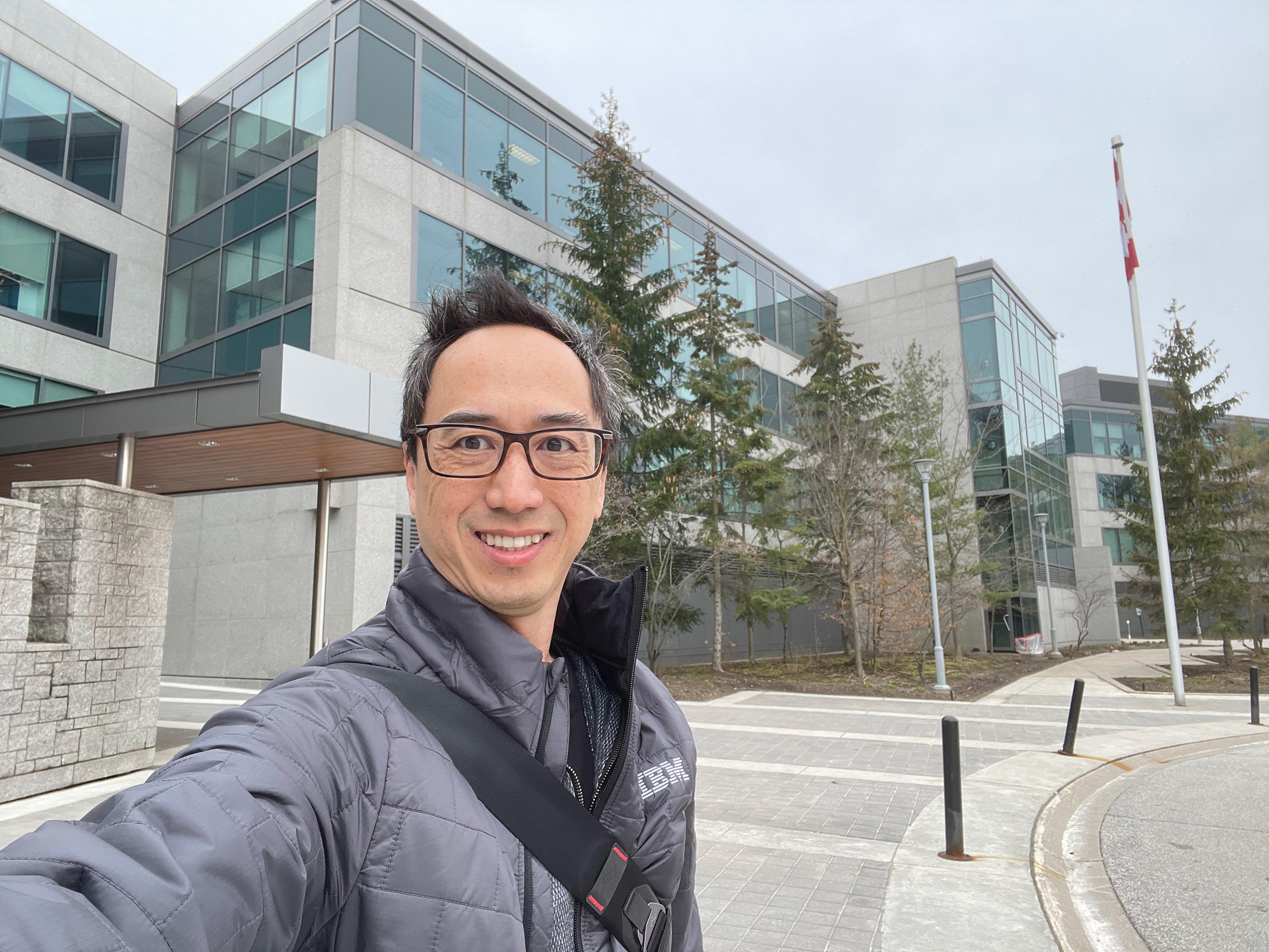
Kevin Yu
Today's Guests
